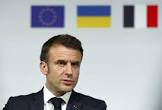$LMT $BA $BTC
#Macron #Zelenskyy #Ukraine #Russia #Geopolitics #Washington #MilitaryAid #Trump #StockMarket #Investing #Crypto #Energy
French President Emmanuel Macron is actively considering a joint visit to Washington alongside UK Prime Minister Keir Starmer and Ukrainian President Volodymyr Zelenskyy, as European leaders ramp up diplomatic efforts to address the ongoing Russia-Ukraine war. The discussions come amid a significant shift in geopolitical dynamics following statements from former U.S. President Donald Trump, who claimed that Zelenskyy had expressed a willingness to negotiate with Moscow over Ukraine’s future. Trump further suggested that Ukraine was ready to sign agreements regarding its mineral resources, fueling speculation over the economic and strategic consequences of such an accord. The market response has been swift, with defense sector stocks such as Lockheed Martin ($LMT) and Boeing ($BA) witnessing increased volatility, as investors weigh the possibility of declining Western military support for Ukraine. Meanwhile, energy and commodity markets have been closely watching the situation, given Ukraine’s vast reserves of rare earth minerals, which are key to sectors ranging from electric vehicles to semiconductors.
The recent diplomatic confrontation between Trump and Zelenskyy, which culminated in the U.S. announcing a temporary suspension of military aid to Ukraine, has further complicated matters. This development has sent ripples through global economic markets, with concerns that reduced Western support could reshape the war’s trajectory. European leaders fear that any decline in military assistance could strengthen Russia’s bargaining position, potentially undermining European security frameworks. Defense-related stocks have seen choppy trading as uncertainty looms over NATO’s role in sustaining Ukraine’s military resistance. Meanwhile, cryptocurrency markets, often influenced by geopolitical unrest, have seen Bitcoin ($BTC) climb in tandem with rising global uncertainty, as investors seek decentralized financial hedges against traditional market volatility.
The energy sector, too, is facing potential upheaval, with discussions surrounding Ukraine’s mineral wealth raising questions about future supply chains. Ukraine has some of Europe’s most substantial lithium, rare earth, and uranium deposits—resources that the EU and the U.S. have been eager to secure as part of supply diversification efforts. Speculation around a prospective resource deal has driven renewed interest in mining stocks and related ETFs. At the same time, oil and natural gas prices remain sensitive to developments in the region, with Brent crude hovering near multi-month highs as traders assess the broader impact of prolonged conflict on energy supplies. While any agreement on mineral resources between Ukraine and global powers remains uncertain, market sentiment has already reacted to the potential shifts in trade dynamics.
In the broader economic picture, the evolving geopolitical landscape underscores ongoing tensions between Western governments and Russia, with significant implications for international trade, military alliances, and financial markets. Macron and Starmer’s possible trip to Washington suggests a concerted European effort to maintain pressure on Russia while ensuring continued U.S. engagement in supporting Ukraine. Investors will be closely watching for further developments, particularly regarding military spending, potential peace negotiations, and how policies from Washington may reshape global risk appetite. Whether through defense contracts, energy price fluctuations, or cryptocurrency movement, financial markets will remain highly reactive to geopolitical shifts as leaders navigate this complex diplomatic juncture.







Comments are closed.